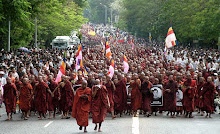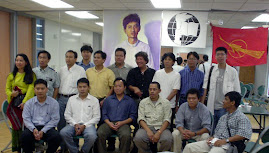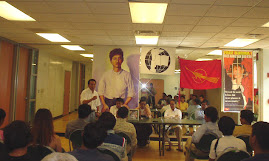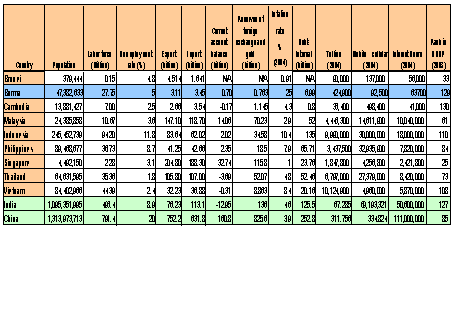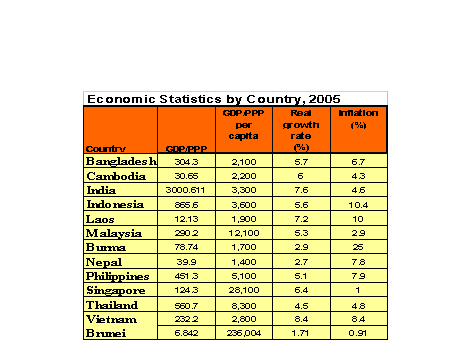
Lack of understanding is no excuse for helpless politics in Burma, writes ROLF EAGLEMAN
Most observers agree that the reaction of the military junta in Burma to the devastation caused by Cyclone Nargis is inappropriate, inhumane or cynical. But on the other hand the international community, including the media, diplomats and intelligence, do not seem to fully understand the background and reasons for this strange behaviour. Calling the regime "reclusive" or "secretive" and going ahead as usual does not appear as a good enough basis for today's "donor conference" in Rangoon.
The usual complaint is: "We don't understand why the generals do not accept our generous help, and let our experts go to the Irrawaddy Delta as fast as possible."
Strange, since this seems the most simple point to understand. Just take a look at the history of this area.
For the past two weeks, the American and French warships with humanitarian aid have been cruising off the delta. About 150 years ago, nearly from the same position, the British colonial armada invaded Rangoon. And only 60 years ago, under the leadership of Aung San Suu Kyi's father, the Burmese army terminated the British occupation - in the delta again.
But permanent peace has never come to this shaken region. With roughly 70% ethnic Burmese, the delta comprises scattered territories. Tribal, commercial and political struggle is very alive here, for many reasons.
When in September 2000 Aung San Suu Kyi tried to meet members of her National League for Democracy (NLD) south of Rangoon, British Ambassador John Jenkins was rebuffed from following her across the river into the Irrawaddy Delta. Western ambassadors barely understand that the delta region is not just a flat area southwest of the former capital, but a "hot place" by all political and security means.
Formerly infiltrated by communist forces, the delta is home to quite a number of ethnically diverse groups: immigrated Tamils and Bengalis, a good percentage of ethnic Karen plus some Mon. The Irrawaddy Delta is considered a breeding ground of opposition movements, too near to the now "economic capital" of the country to be ignored. There are records dating only some years ago about Burmese army bombarding "rebel cells" in the township of Bogale - now mostly destroyed by Nargis.
The Burmese military, the "Tatmadaw" and their leading generals consider themselves still in the same fighting position as 50 years ago.
Although they were quite successful in decimating and controlling most of the "enemy forces" and proud to have kept Burma together as a country, against all centrifugal forces, they will not leave the battlefield to "aliens, communists or western-type democrats."
Contrary to the international community, they are very aware that just some decades ago a Burmese president was ironically called "Suburb President" since his military power ended on Rangoon's city limits bordering the Irrawaddy Delta, and today's suffering Karen groups once showed their rifle power to the struggling Burmese Army.
No wonder that for the last 50 years the Irrawaddy Delta has been under tough military control. Some famous Army officers have served as regional commanders in this area, earning a lot of medals for keeping down the "enemy within". Among them: the late dictator Ne Win, who first attacked the British colonial forces in the delta, Snr-Gen Saw Maung and - you bet - Snr-Gen Than Shwe, the current junta leader.
Ironically, since the generals never managed to get the country economically back on its feet, many people in the Irrawaddy Delta remain critical of the Tatmadaw. People voted strongly for the NLD in the 1990 democratic elections. Not that they wholeheartedly understood democracy, but they trusted Aung San Suu Kyi for the simple fact that she equally represented "the honest part of the military," like her father.
Until today, the NLD leadership is mainly composed of former Tatmadaw generals, converted into democrats.
Barely keeping up with the "enemy within" and getting the angry monks under control, how could the generals suddenly let hundreds or thousands of potentially "destructive elements" into this highly sensitive area?
Didn't the American president himself recently classify Burma as an "outpost of tyranny" like North Korea and intensify sanctions against the country?
Didn't the European Union harden its criticism and boycott policy against the country? So how could the generals suddenly trust these self-declared enemies?
Soldiers don't take risks
Of course, the leadership in Naypyidaw is aware that the majority of the helpers are real ones. But soldiers will not take any risk. Along with the experts, technicians and humanitarian aid workers, numerous journalists and some of the usual "in telligence community specialists" will come to the delta, see the total mess and report it to the world. Worse, they could incite the suffering people against the military - a situation they barely survived nine months ago.
This is the "dilemma of the generals." In order to uphold the country's integrity and themselves as the guarantors, the old soldiers in Naypyidaw will not accept any alternative which might include a risk for themselves and their future plans. Hence, the urgency to continue with the national referendum, at whatever cost.
Letting the people die is a lesser problem for them, since they consider the "prevailing importance of security, law and order" above all else. The so-called "international" pressure is as old as themselves, and the generals are sure that nobody from outside can really and deeply understand them and the situation in the country.
As long as they don't fully understand these basic rules, US President George W. Bush, Thai Prime Minister Samak Sundaravej or United Nations Secretary-General Ban Ki-moon won't have any real say - and they will remain side players in the foreseeable future.
The "Emperor of Naypyidaw" wants to be the first post-war leader leaving the country united, with a safe "constitution" and weak opposition and ethnic power. Why should he take any uncontrollable risk because of some tens or hundreds of thousand dead people? It is a natural disaster anyhow.
The experienced leaders of Asean (Association of Southeast Asian Nations) perfectly understand every action, reaction and behaviour of the Burmese leadership. Hence, it took them more than two weeks to think about any type of help. The matter was too hot and Asean was not ready.
Asean may be an economic tiger, but is still a political pussy cat. So Asean is acting as a "buffer" between the generals and the "aliens". The ugly truth is that the region needs Burma more than the generals need them.
Burma exports a lot of gas, timber and stones and will be a big supplier of electricity in the future. It will be a Pandora's Box of regional trouble if their neighbours don't comply. No wonder military brains like the Indonesian minister of defence uphold the idea that "a bit of dictatorship is better than a civil war."
But letting a large number of people die is different from losing money on the stock exchange.
So many people died in the delta because they lived in poorly built wooden huts and houses, which were swept away by Cyclone Nargis. Even if they got early warnings, what could they have done? Swim to Rangoon?
Therefore, like what happened in last year's petrol price upheaval, the solution does not lie in politics, but with the politicians, who ignore people's most basic needs: food, drink, shelter, health, education. The generals, staring at the danger of "real democracy", forgot that people don't eat democracy, just food. They missed the chance to give them just that.
Modernisation is key
Giving immediate help to the cyclone victims would have enabled the generals to save the country's "rice bowl". Now the harvest is gone, and the fields are salty.
With the hard-working people in the delta and some more monsoon rain they could have saved the future.
Two-thirds of the national rice production came from the Irrawaddy Delta. Again, the faltering economy, not politics, will hammer the final nail into the coffin of the irresponsible leaders.
Did they have any alternative? Yes, they did - like King Mindon in the mid-19th century. This wise leader realised that he "had to adapt to an increasingly European-dominated and fast-changing world."
"Burmese way" or not, he understood that seriously modernising the country was the only chance for a prosperous future. But modernising does not work the generals' way: building roads, dams and bridges, plus some telephone lines.
Modernising starts with education, learning, self-criticism and even taking some risk. Prison camps do not contribute to modernisation, even if the prisoners work very hard. China gave an impressive example just now: although they are for sure not a democracy and don't like foreign critics at all, they first served their people, let foreigners in, including helpers and journalists. Now even the critical Western world respects and hails China's efforts.
A poor Burma will never end the internal unrest and ethnic trouble. A prosperous and wealthy country on the contrary could easily integrate divergent groups and make everybody happy. By the way, Europe's most stable and wealthy country - Switzerland - was the worst ethno-fighting and killing zone centuries ago.
King Mindon had no chance in his time - the British intruders terminated his reform plans. Luckily, his "brother in mind", King Mongkut of Siam went ahead, successfully implemented reforms and opened up a better future for the Kingdom of Thailand.
The generals of this world should do their job: fighting the enemy from outside and keeping the borders safe. Just as a minister of commerce should not drive a tank, how can a tank driver run the complicated economy of an even more complicated country?
If the Burmese rulers don't understand this logic, they should have a look at their successful neighbours, before they disappear in a million empty and angry stomachs.
Rolf Eagleman is a freelance journalist.




_-_January_1960.jpg)




























